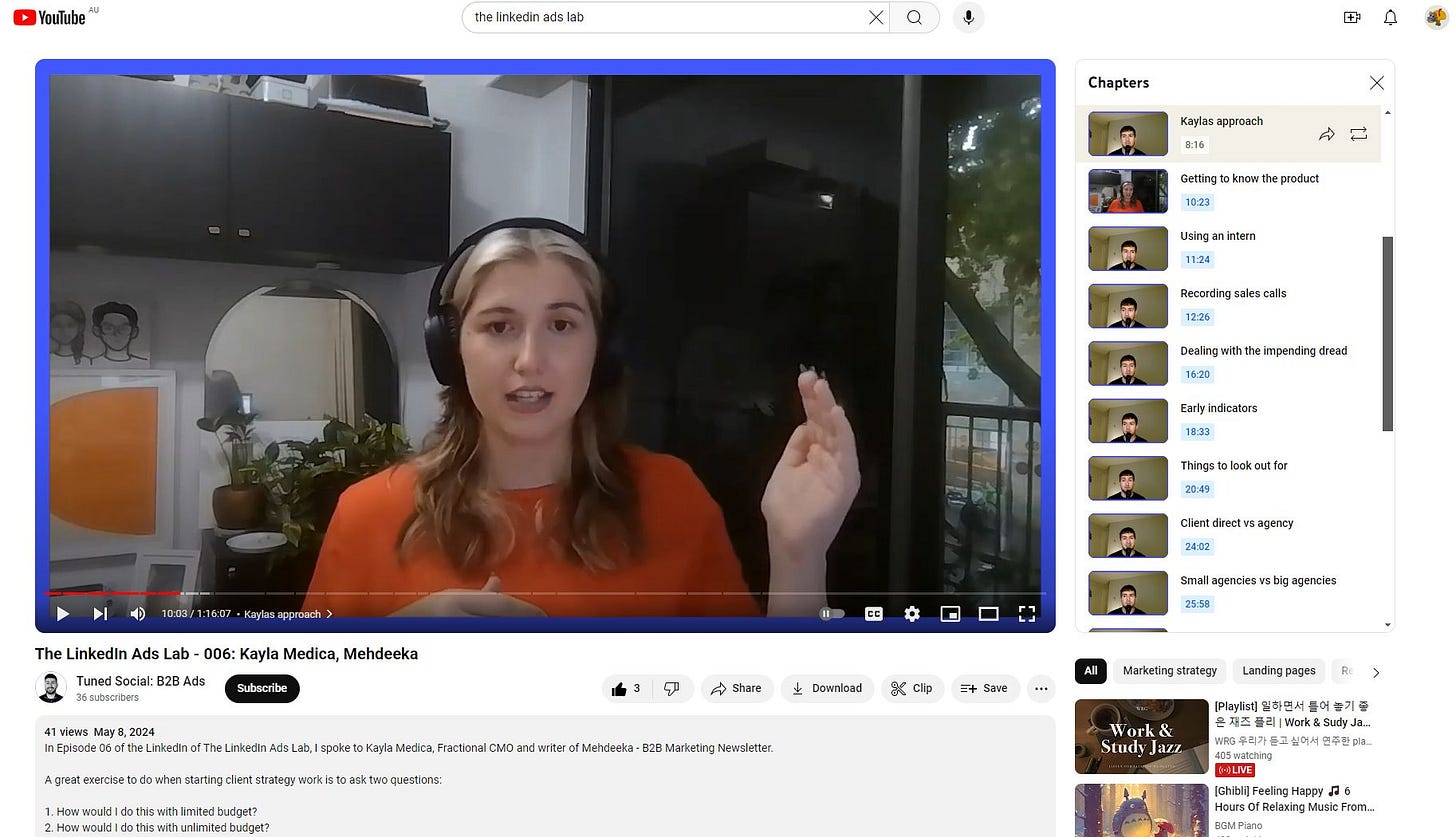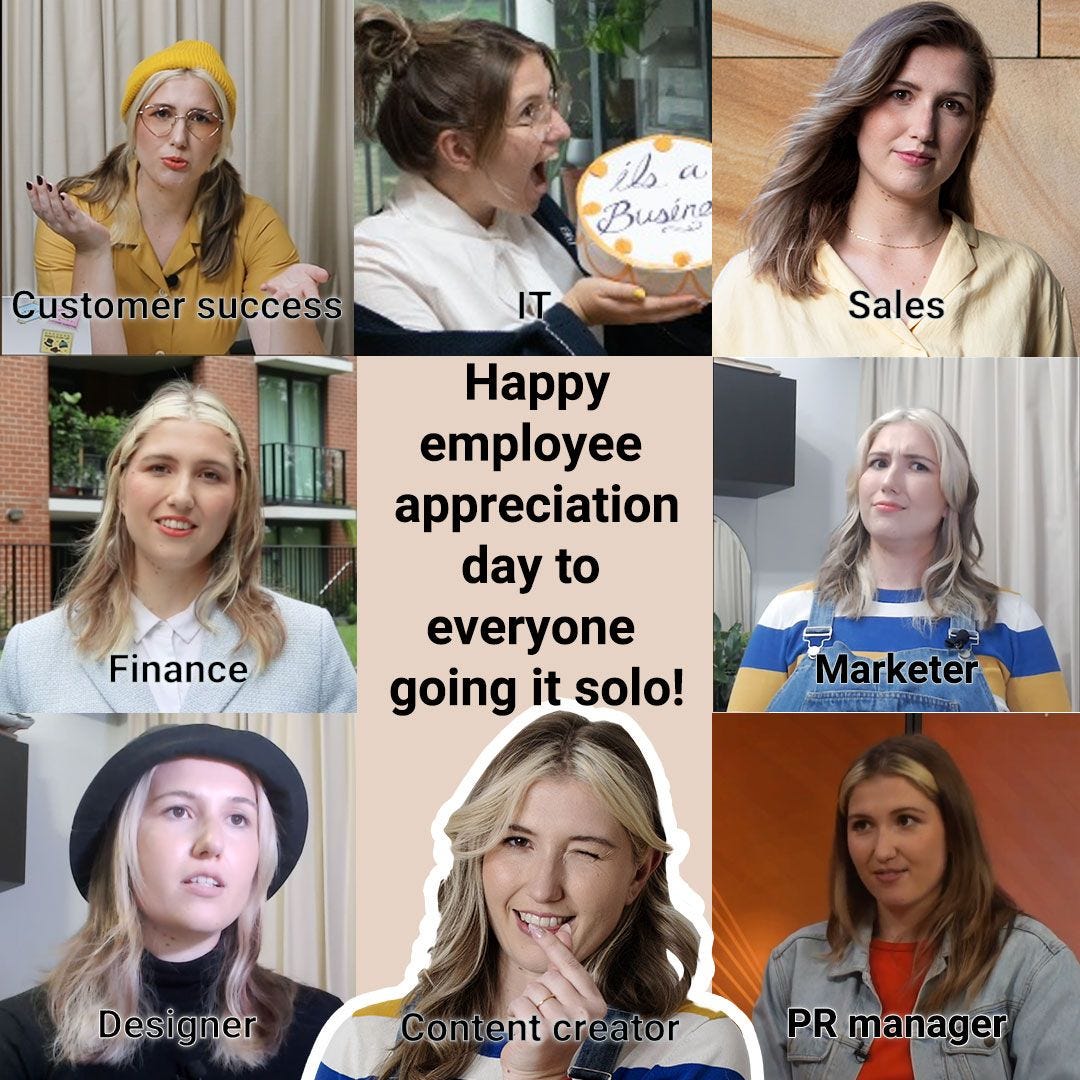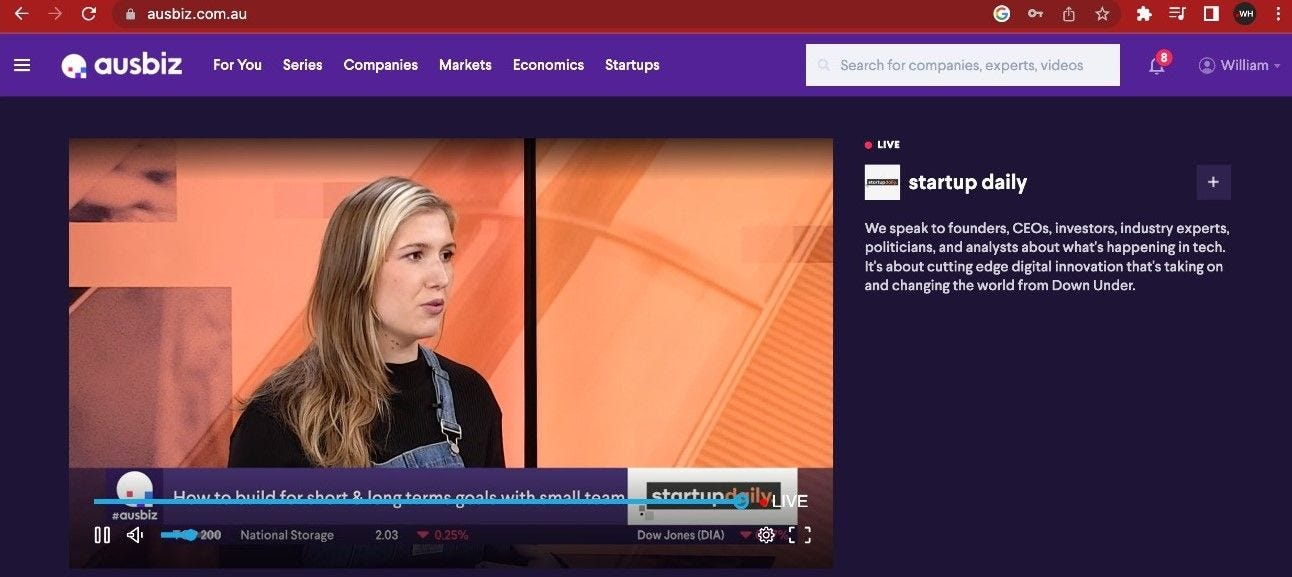📬 In this issue:
An overview of how I work as a “fractional” marketer and how I define it
How I got started (hint: it starts with rage quitting a job)
Business rules and tips I’ve picked up along the way
This week’s referral thank you gift for one Mehketeer is a one hour consultation with me, and this time to enter you just have to fill out the reader survey! The survey is anonymous, so once you’ve filled it in just reply to any Mehdeeka issue to let me know you want to be part of the draw!
Whether you want to talk about your career, a project you’re working on, questions about what I do, or literally anything, you’ll get my undivided attention for 60 minutes, open globally!
Hello, Mehketeer!
In December of 2022 I quit my full time job as a head of product marketing at a startup that had raised $150M USD, and I got told not to serve my notice period and wrap up on the spot.
Caught by surprise by that last part, I had intended to work the rest of December, take January off (important detail: a lot of my friends had at least the first two weeks of Jan off from work, so the plan was to socialise and go to the beach every day), and pick up the job search in February. What ended up happening was I got bored out of my mind within the first week, because I had no one to hang out with, no one was hiring that close to Christmas, and without a job lined up I was financially ok but couldn’t justify going out every day, you know?
I threw up a LinkedIn post saying I was available for work and open for coffee catch ups. That post got me a few sympathy messages (both from people I did and didn’t know) saying they could throw me a bone with some temporary project work to help me through Dec-Jan. I took on one of those projects.
I did find a full time job and started in February, but four weeks in felt it wasn’t the right fit and left in March. My last day was a Friday, and the next Monday I was a full-time freelancer/contractor, with almost a full roster of clients.
I had reached back out to the projects that I’d turned down and asked if the work was still available — they all said yes, and they’d be happy to give me the work. I knew most of them because they were either old colleagues, people I’d met at startup events or coworking spaces, or colleagues of colleagues.
I got my good friend and ex-colleague Harrison (who runs a Substack about gaming, and also featured in an old Mehdeeka!) to give me a run down of being self employed, and hit the ground running.
P.S. I’m also going to throw in some “career highlights” from my 18 months in fractional work!
What is “fractional”?
In all honesty, only people who work as “fractionals” care that much about the word itself. All of my clients either call me a freelancer or a contractor. I would say I define “fractional” as having a few extra levels of access to the business.
Where a freelancer would be given a brief to execute, I write the strategy and do the execution (including briefing and managing others, even in-house, full time employees.)
Where a contractor has a clear start and end date, unless I’ve engaged a client in an explicit project capacity, there’s no end date to our relationship.
I’ve spoken at conferences on behalf of clients, some of them refer to me as their CMO, others refer to me as their marketing manager, I speak to their clients, I occasionally manage their team members (I even gave a performance review once), and I help them hire. It’s really kind of all over the place. I am what they need or want me to be.
I like this explanation from Fractionals United:
When I speak to a potential client, I pretty much never use any term to describe employment types (i.e. fractional, freelancer, contract.) What I do is describe the services I provide, and the outcomes I can help them achieve. On LinkedIn, my profile description says “joining sales and marketing” — and that’s usually where I start with clients!
Q&A
Here’s some reader submitted Qs, and my As:
How do I find clients?
I wish I had an answer to this, but like I said at the beginning, they all kind of find me. Since my first round of clients which came from that LinkedIn post, I’ve gained new clients through referral, one situation where when I asked how they found me the answer was “everyone kept saying your name” (who is everyone!?), and on two occasions I’ve posted on LinkedIn to say I had a slot free for ongoing work and had people I knew from years ago jump on it within a few hours.
I will pause here to say I know a lot of people don’t have as easy a time. Networking without an ask and being generous with your time and knowledge will come back around in a way you can’t predict!
When it comes to leaning on family and friends, I did a little bit right at the beginning. My husband runs an agency, and I did some content for them, but it was stuff they kept deprioritising internally and just needed someone to do it. It was a pretty small amount of work, but at least it gave me something to post on LinkedIn.
I never really show clients a “portfolio”, I find it’s much more conversation based, and being able to show I know what I’m talking about, I can put an action plan together, and I can hit the ground running. That usually gives confidence to the person I’m talking to, even if I don’t have experience in their industry or product category.
How do you assess whether a client is a good fit?
Great question! I have two rules when it comes to working with people:
No first time founders — not because I don’t like them, but they end up asking lots of non-marketing questions, and it veers off-scope pretty quickly. I am in a position where I can choose what I work on, and I don’t want to work on that kind of stuff so I just don’t (but I am always open for a chit chat with them!)
We always start with a project — I always identify a small piece of work that can be done within 2-4 weeks with a tangible outcome (think: a sales pitch review, some collateral, content, home page rewrite, etc.) so we can both evaluate each other for working style and quality of work. If one of us isn’t happy, there’s no awkward breakup, just a “don’t continue”.
If the project goes well and we both like each other, then we move to a monthly retainer agreement for a set amount of hours, with a “use it or lose it” approach.
My clients have fallen into two categories, although I didn’t necessarily know this before I had a few and found the pattern:
Founder-led sales, no marketing team, needs end-to-end marketing strategy and execution
Has a sales team, has a marketing team, needs purely just product marketing (but greatly appreciates that I can also do content)
How do you define a scope of work for 1-2 days a week?
Usually during the above project, I’ll make a point of talking to different people as a way to gather information I need for the project, but also to do a bit of a mini audit on the state of the business/marketing function. At the end of the project, I’ll also present a list of observations.
That list pretty much becomes the backlog of work for an ongoing retainer-based engagement. And then it’s just keep ticking things off the list and responding to any additional things that pop up as you go.
Usually this works fine and allows me to be responsive to whoever needs me. There’s probably only been two weeks during this whole period where everyone has asked me for something big or urgent in the same week, and I just end up working late to get it all done. Otherwise, I’m usually pretty good about starting at 9am and finishing around 4pm.
I engage with my clients either as “a bit of everything” marketing (much like what Mehdeeka covers) or as purely product marketing where they have the rest covered. I’m explicit in that I won’t do social media or events, unless you’re super special to me.
How do you juggle your clients?
So I have three on retainer, and one on day rate. The day rate client locks me in for one day a week where I go to their office in person, and during that day I try not to do work for any other client, but I do occasionally get a meeting from another client.
The other three get me a little bit each day depending on the work that’s going on.
At the start of the week, I create a to-do list for each client, and also mark down any work that has to be done on/by a certain day, then I work through that list sort of whenever I feel like it. For example, I might be blocked on one client, so I switch to another.
I have weekly or fortnightly check-ins with all of my clients where I’ll run through what I’ve done, what I’m doing, where I’m stuck, and also make suggestions for what to do next when tasks are finishing up.
How did you figure out your rates?
I pretty much picked an aspirational number for how much I wanted to earn ($180k, I’ve been pretty public about that number) and then divided it by a day/hourly rate.
I changed it around a couple of times, also thinking about how many retainer clients I think I can juggle (for the record, optimal is three, currently I have four) and then divided 180 by 12 (as in 12 months) and then by four (clients) to come up with a retainer rate, but then honestly people were saying yes way too quickly to that, so I kept adding more to it every time I picked up a new client (adjusted for if they wanted more/less capacity from me), and now I have a monthly rate that is my annual goal divided by 11 months, to account for taking time off.
This year, I’ve been aiming for one week off per quarter to prevent any major interruptions to cashflow.
One really great tip I got from Harrison was to keep rates to an amount that someone can say yes to without having to get layers of approvals. This does look different for different businesses and who is soliciting your services though. I’ve definitely gone into businesses thinking I charged an appropriate amount and then realised they’re in an industry or business size that has a different perspective on “reasonable” than I do.

How is your business set up?
This is very Australia-specific:
I’ve got an ABN as a sole trader, I use my personal gmail for work (no one has ever cared, for the record), I pay quarterly BAS to avoid having to pay my tax all at once, and I max out voluntary super contributions to reduce my tax.
I’m kind of at the point where I could incorporate as a company and change my structure, but honestly I need to speak to an accountant to figure out what the best strategy is, and I am lazy.
Each month I put 50% of my income into a savings account, and from that account I pay tax and super. Last year I paid super as a lump sum at the end of the year, but this (financial) year I’m doing monthly payments.
Every client I have signs a services agreement that includes scope of work (usually quite vague), a termination clause, and payment terms. I’ve luckily only ever had to chase payments where they’ve genuinely forgotten and then paid as soon as I reminded them. I genuinely ❤️️ my clients because they’re all good people.
Did you get overwhelmed by having so much to do when starting out?
Not really, I actually think it’s good to be lazy at the start. I’ve spoken to a lot of people who’ve said something along the lines of “I’ll be ready to go freelance when I’ve done xyz” but I think that’s the wrong approach.
I don’t have a website. I use my gmail. I used the free version of G Suite at the beginning, I got clients by posting on LinkedIn. All of that is free/low lift. Getting an ABN is instant and free. I didn’t have a services agreement until one of my clients gave me one to sign, then I copied it for myself and have refined it over time based on new clients having requests or legal teams review it (basically free legal advice tbh.)
Over time, it’s become more sophistocated, little by little. I spoke to other self-employed people and asked for tips and advice, asked “what do you wish you’d done earlier”, and pretty much pieced it all together from there.
Where are your skills gaps when it comes to running a business?
I sort of purposefully keep my business simple so I don’t screw up too much. As I mentioned above, the tax structure is something I know needs improving, but I don’t really trust my accountant that much and am looking for a specialist one that knows self-employment and startups/tech industry better.
I would say I have a lot of motivation gaps. Skills gaps can be filled by outsourcing, but I would say the hardest part is things I’m good at (marketing) but don’t want to do (marketing myself.)
This newsletter is a perfect example. I hardly promote it. I find it annoying to promote. Every season I tell myself I’ll do a video for each issue. Have you seen even a single video? Nope, you have not. Because I deprioritise it.
If anything, I feel like I need a manager/accountability person.

Here’s my non-solicited advice
Maybe you read this because you’re curious, and maybe you read this because you’re thinking about going the self-employed route. Here’s my tips for you if you’re in the latter:
There’s a lot of work available
Right now (at least in Australia), there’s an abundance of work for people like me. A lot of companies who partook in layoffs, laid off their marketing teams. And since then, they’ve realised they still need marketing, but they don’t want to re-hire full time. That’s where I come in.
Add the product marketing skills shortage in Australia, and there’s even more demand. I regularly turn away new clients because I just don’t have capacity to service them, and the other people I know doing freelance PMM also don’t have capacity — we need people to refer clients to.
Factor in time off and shut downs
I mentioned this before with how I divide my income goal by 11 months, but you also need to think about sick days, etc. I am scheduling my wisdom teeth removal for December because that’s also when a lot of my clients shut down for Christmas, so you need to factor that in too.
Find community
I missed having a team pretty quickly. Some of my clients are super social, and others aren’t. Finding a community you can ask questions to, celebrate wins together, and have a little makeshift “team” with is important and has been super fulfilling for me.
My preferred marketing community for in-house B2B marketers in Australia is Generate.
Generate also has a summit event this November, and I’ll be speaking! Come see me speak.
Seek out experts
I’ve been to many conferences since becoming self-employed because I don’t have as many more senior people to learn on-the-job from. Keeping up to date with learning and development is important for me to continue being a valuable resource for my clients (but it is expensive, and more painful when you’re paying out of pocket.)
It’s not just your skillset though, it’s also the business side of things. I recently read Secret Tradecraft of Elite Advisors which is about the business of consulting. It gave me a lot to think about in terms of growing my “business”.
The typical go-to options are:
Work more
Charge more
I honestly don’t want to do either of these things, and so I’ve been thinking of alternatives for a while. This book gave me a new perspective on the idea of ‘productising’ services. The general way to ‘productise’ a service is to put it into pre-configured packages (and this book also covers that), but it also layers on the idea of producing IP you can sell. It could be data, reports, content, workshops, and so on.
Workshops was one of the earlier ideas I had, and I’ve done a few. The downfall in it is chasing the work? I don’t know, I haven’t actually advertised that I do them so I haven’t really tried and I don’t know how much I could feasibly charge for them. Could two workshops a month replace a retainer? Not sure. (Interested to find out, but see: lazy.)

You do need to genuinely be an expert
I don’t think you should jump into being self-employed because it seems easy, fun, or like you can make a lot of money. You should give it a go if:
You have a specialised skill that could earn more money being self-employed than full time employed, and
You have enough business experience to understand how not to get ripped off or get stuck doing lots of high volume, low value work
Got an unanswered question?
Come join the Mehdeeka WhatsApp community and ask me there! I am (as you can hopefully tell) an open book, and I post links to cool things I find every now and then in there. It’s pretty chill!
Next week we should have a big announcement, followed by another experiment reveal, and a fun one to end the season.
See you next time
Kayla








Thanks Kayla. What's your take on just going to market purely under your personal name vs having having a content brand like Mehdeeka to work under. Do you see it all as one entity in your case, what was the sequence for you?
Thanks for the shoutout! You're killing it Kayla, and it's my absolutely joy and privilege to (in the smallest way) have supported your success! Keep gunning it!